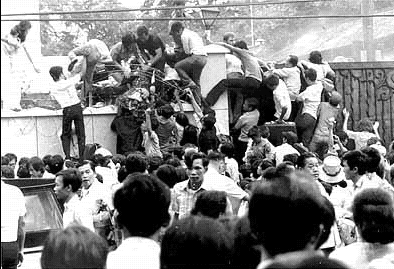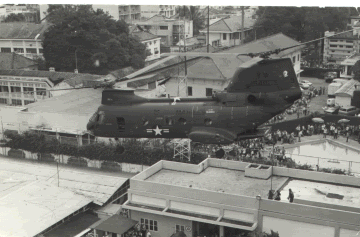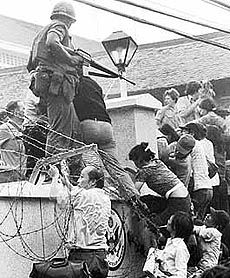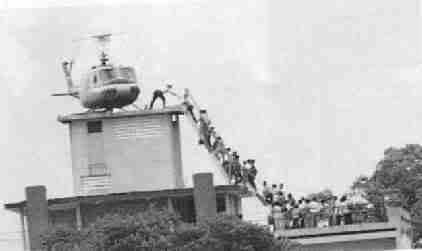
With an 80% turn-out, the first "democratic elections" in Vietnam were followed four months later by the Tet Offensive of 1967. Iraqi elections were on the 37th anniversary of The Tet Offensive.
http://www.reuters.com/newsArticle.jhtml?type=reutersEdge&storyID=7337643http://secretsinbaghdad.blogspot.com/
-----
WASHINGTON (Reuters) - Iraq's Jan. 30 elections fall on the 37th anniversary of the Tet offensive, the Vietnam War turning point that could hold lessons for Iraqi insurgents and U.S. policy makers anticipating more violence that could test American resolve.
Iraq's insurgents lack the coordination, manpower and resources to execute the equivalent of the jolting attacks launched by communist forces in nearly every major city in U.S.-backed South Vietnam on the nights of Jan. 30 and Jan. 31, 1968, experts said.
But they said the experience of the Tet offensive may show Iraqi rebels how to prevail against a vastly stronger U.S. force, by using audacious attacks to score psychological and political triumphs.
"The fundamental lesson of the Tet offensive is not the immediacy of the event, but it is about the political will of the United States, and how you grind at that and you never let up on that, never lose focus on it," said Marine Col. Thomas Hammes, a leading military expert on insurgencies.
Iraq's insurgents, experts said, may try to stage high-profile attacks to disrupt the parliamentary elections -- touted by the Bush administration as a key milepost of progress -- with the same goal as communist forces in Vietnam: making the Americans go home.
"The overall goal is pretty much the same. The United States is a distant intervening power. They (insurgents) are fighting on home turf. And they believe they can outlast the United States, and that ultimately the American people will tire of that mission, particularly if they can inflict enough casualties," said Cato Institute defense analyst Ted Carpenter.
The White House last week acknowledged that the elections would probably be "less than perfect," due to violence, but insisted that they proceed.
PROPAGANDA VICTORY
The Tet offensive, which coincided with the lunar New Year holiday Tet, was a heavy defeat for the communist forces in strictly military terms.
However, it gave them a psychological and propaganda victory which vividly rebutted the Johnson administration's rosy portrayal of the fighting, broke the will of U.S. political elites, and triggered a steady erosion in American public support for the war. Two months later, President Lyndon Johnson announced he would not seek re-election.
Roughly 80,000 communist fighters -- Viet Cong insurgents and North Vietnamese troops -- staged surprise attacks on the major cities of South Vietnam, dozens of provincial capitals, and countless smaller towns. Commandos raided the U.S. Embassy in Saigon.
More:
http://www.reuters.com/newsArticle.jhtml?type=reutersEdge&storyID=7337643
See also:
In Iraq, Echoes of Another Offensive
By Charles A. Krohn
Wednesday, December 29, 2004; Page A19
Jan. 30 will mark Iraq's first elections on the road to democracy, provided all goes according to plan and administration expectations. It will also mark the 37th anniversary of the turning point in another American war: the Tet offensive of 1968. That was when Americans lost confidence in official pronouncements that the war in Vietnam was winnable.
It must be coincidence that the election date was set for this anniversary. Yet those of us who have vivid recollections of what it was like in and around Hue that year have reason to keep our fingers crossed, hoping that there is indeed no parallel between the two dates.
In January 1968 I was serving with the 2nd Battalion, 12th Cavalry, ordered by the commander of the Army's 1st Cavalry Division to relieve the Marines surrounded in Hue. It was a valiant but futile effort, and the battalion casualty rate was more than 60 percent.
I wonder: Are the insurgents in Iraq students of history? Have they studied Ho Chi Minh's playbook? Are they familiar with Gen. Vo Nguyen Giap's dream of cutting the country in two? Do they recall what happened on Jan. 30 -- the storming of our embassy and the attacks on virtually every provincial capital? Do they know it took 28 days to eject Giap's soldiers from Hue, the ancient -- and highly symbolic -- imperial capital? Are they aware that protracted war goes against the grain of the American experience? Do they understand that the president's encouraging words are effective, but only up to a point, given battlefield reversals and disappointment?
More:
http://www.washingtonpost.com/wp-dyn/articles/A32587-2004Dec28.html
See also:
http://us.oneworld.net/article/view/101820/1/